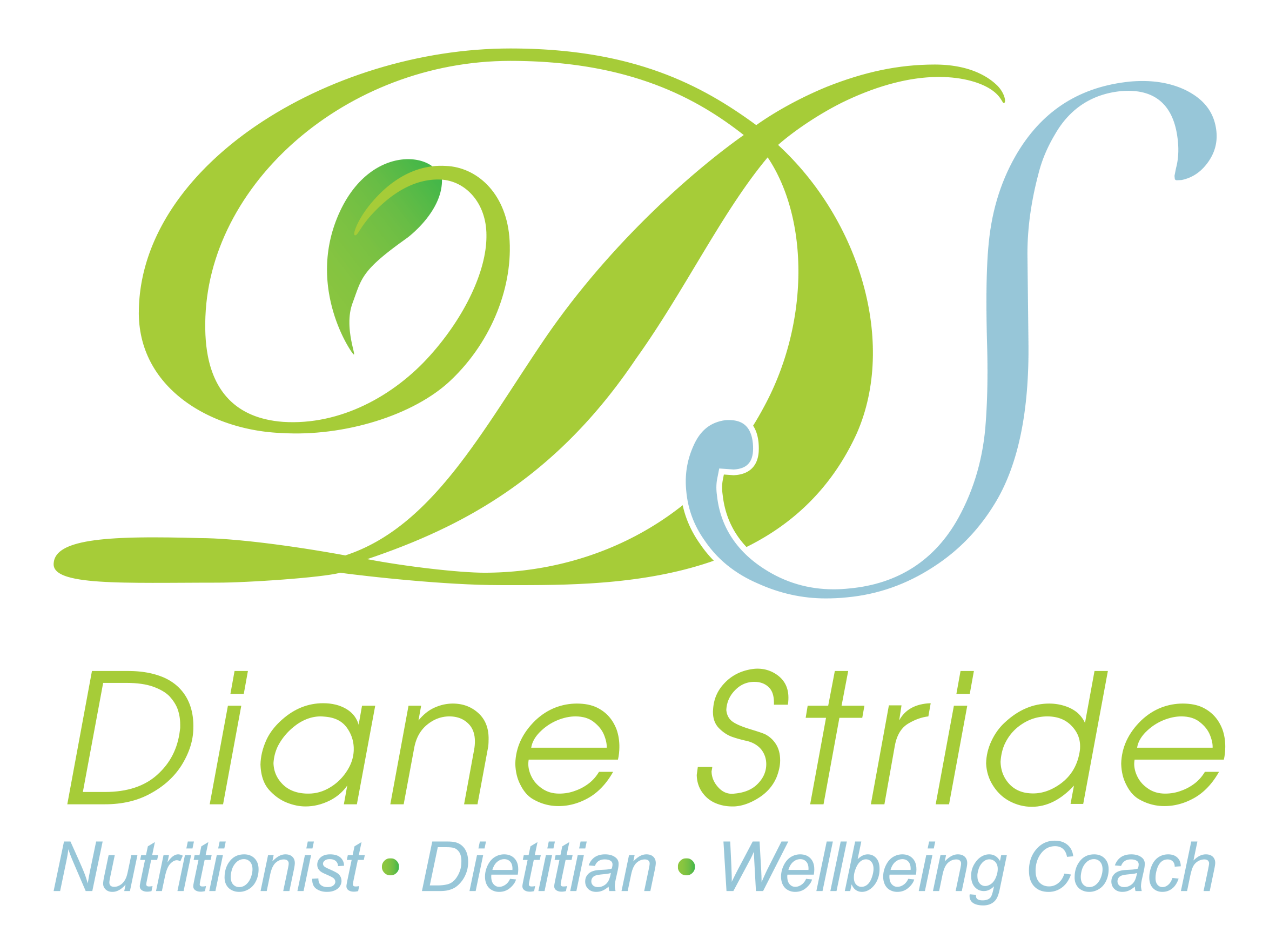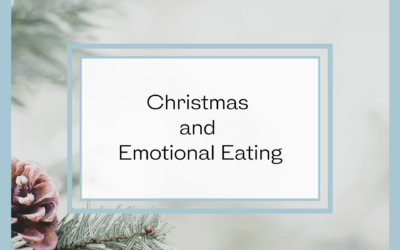Stress and Your Health – 3 Things You Can Do
Do you feel like your health is not the best that it can be? Maybe you’re often anxious, on edge or forget things? Perhaps you feel overwhelmed, like each day you’re tired and going through the motions to get your job done. Maybe you’ve been to your doctor, but blood tests have shown there is no physical explanation. You ask yourself, “What if something is wrong? How can I feel well again?”
As a dietitian, nutritionist and wellbeing coach, it is important for me to look at the holistic picture. For that reason, in addition to my Nutrition degree, I have done significant other psychology-based training, to support my clients in all aspects of their health journey. Nutrition plays a key role in health, but so does sleep, thought patterns, stress and exercise. In this blog, I’m going to explore the role of stress in your health. In future blogs, I’ll explore nutrition topics.
First a recap
In my first blog I explored stress responses. See how many of these impact you on a daily basis:
- Experiencing negative emotions – frustration, worry, anger, irritation, despair – you get the picture. The important thing is that even a minor emotion such as frustration, is still perceived as a stress by your body
- Being too busy
- Feeling pressured
- Saying hurtful things to others
- Behaving in a way that doesn’t align with your values
- Thinking negative things about yourself or others
What happens when you are consistently feeling or doing these things?
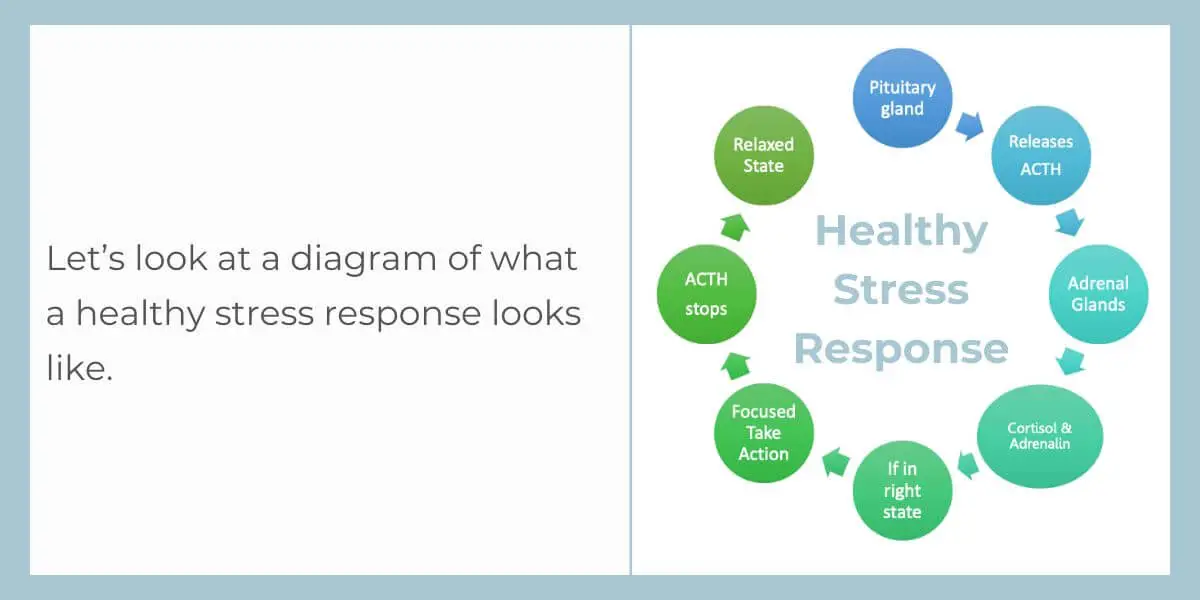
Your brain senses you’re in danger (real or not) and sends a message to the adrenal glands on the kidneys, to produce the stress chemicals cortisol and adrenalin. These provide you with the ability to take action.
Once the threat is over, the brain stops sending the messages and so all returns to a relaxed and balanced state.
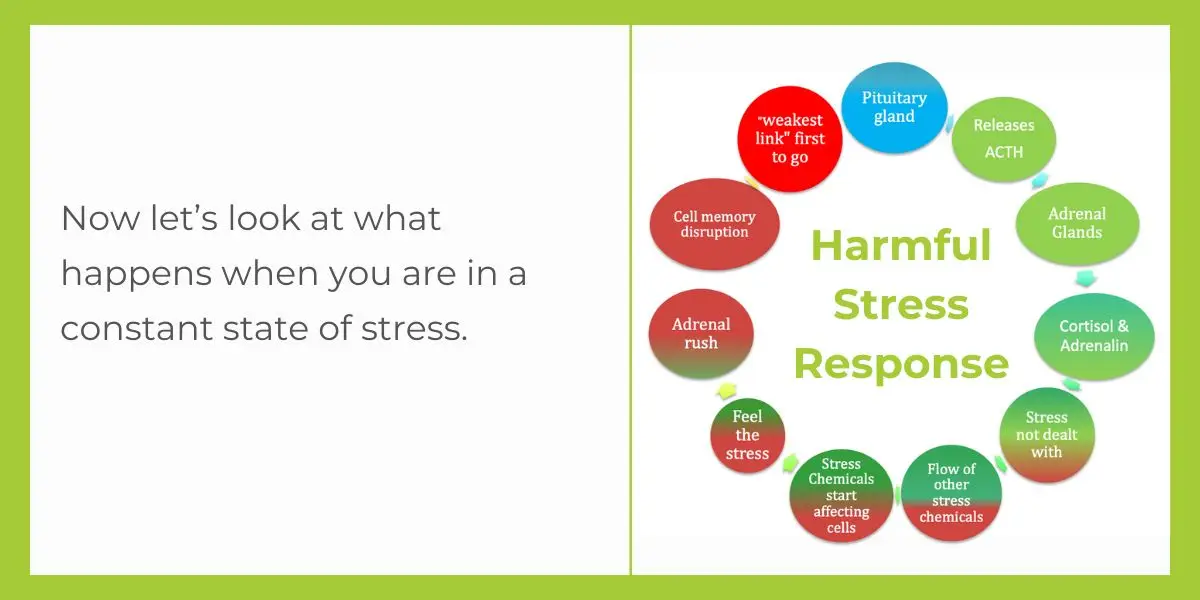
Let’s imagine you have to give a presentation. The brain sends a message to produce and release the stress chemicals cortisol and adrenalin, enabling you to be alert and focused. The presentation is finished, but you worry about what people thought about it , so the stress/threat is not dealt with. That means the stress chemicals designed to help you manage the threat keep being released, because your brain thinks the danger has continued. In the diagram above, I’ve used the colour red to show this happening.
Because of these chemicals constantly being released, cell damage can begin to occur, and you may be increasing your risk of developing illnesses or disease that you are susceptible to. Say for example, one or both of your parents developed heart disease at a young age, so you carry this gene. If you are constantly stressed, don’t sleep properly and don’t nourish your body, you increase the chance of this gene being activated. In the diagram, this is when it says, “weakest link goes first.”
But hang on a minute – let’s just pause here for a second, because I don’t want you jumping to conclusions!
Firstly, there are many things that can cause us to have heart disease, cancer, endometriosis etc. I am not for one minute saying that because you were stressed and didn’t manage it, you’re now ill.
Secondly, the exciting thing about stress is that we can do something about it, given the right tools and strategies. This is the part of my job that I love, because I can see the change in my clients.
Why am I so tired all of the time?
Assuming we have ruled out medical reasons for this, stress can certainly be a big contributor to this.
I will never forget organising a big event in Hawke’s Bay and being really worried about many aspects of it (this was before I learnt about and understood about stress). Looking back, it was evident that for the weeks leading up to it, I would have had far too much cortisol and adrenalin being released every day, forcing my body to “function” at this super-alert high energy level. Coming off that constant adrenalin and cortisol raised level left me feeling so exhausted that I slept for an entire weekend! The crash of the stress hormones literally left me feeling exhausted, and the same can be at play for you.
Experiencing stress from any of the scenarios above can also affect your sleep, which can then make you release more stress chemicals as you worry about not being able to sleep.
The lack of sleep can then also make you feel like you wake up not feeling refreshed.
Let’s go on now and explore some health conditions and how stress may impact them. To keep this blog simple, I’m not going to delve into too many details, so this is just an overview.
Stress and Health
1. Stress affects your body clock.
As I’ve mentioned, cortisol is one of the hormones released to help you manage stress. It is designed to decrease through the day and drop to its lowest level at midnight.
In addition to helping you manage stressful situations/threats to the body, cortisol has other functions. These functions only work well, though, if cortisol has the natural fluctuation as mentioned above. If the levels are too high, it disrupts how the functions are managed, which can lead to illness.
When cortisol is at the correct levels, it
– helps manage your fight/flight response
– regulates your blood pressure,
– supresses inflammation,
– regulates blood sugar levels;
– maintains your body clock or circadian rhythm.
The body clock is important because it assists in keeping many of your systems functioning normally. When this body clock is thrown out of balance by having cortisol levels at a constant high through the day, it can disrupt many of the normal body functions and cause chaos, affecting your health. It would be a bit like the mid-morning bell going at school and you arrive in the staffroom expecting to see scones, and suddenly you are told to run laps around the staff room. It would cause a bit of confusion and momentary chaos and disrupt the flow of your day.
The pictures below show you when cortisol is at the correct levels, thereby supporting your body clock, versus when you have unmanaged stress in your life and cortisol stays elevated.
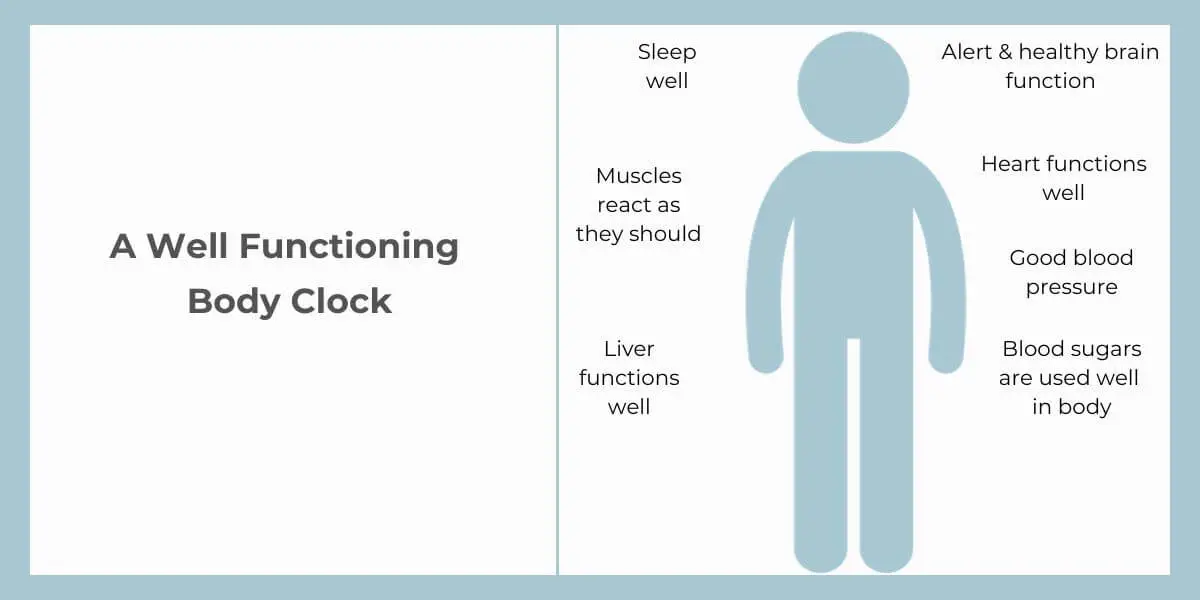
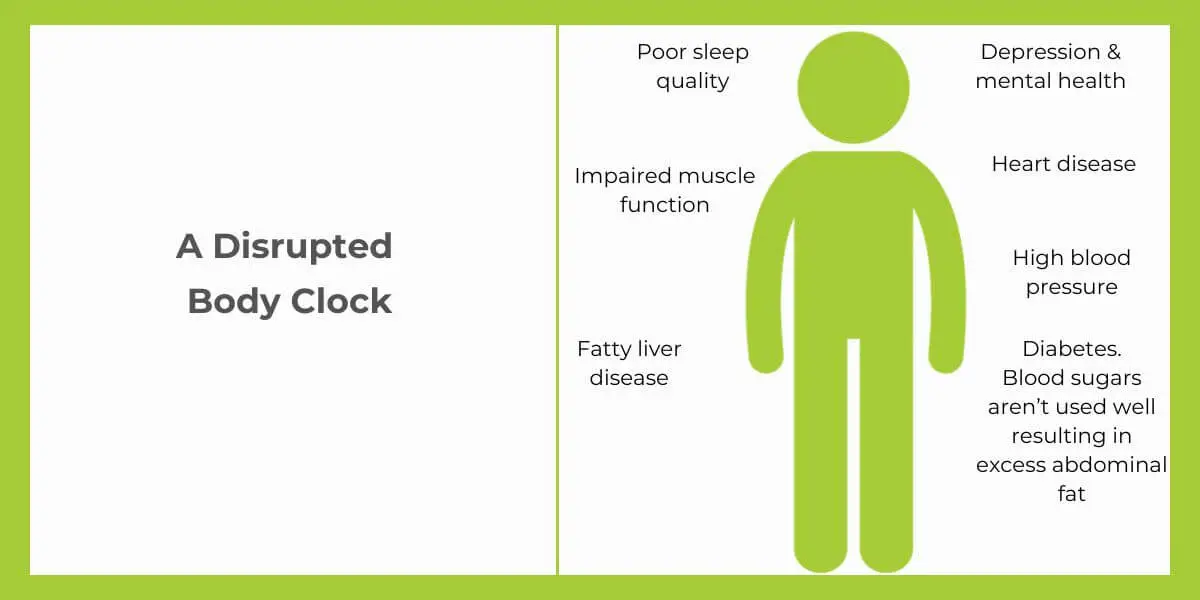
2. Stress leads to inflammation
In this instance, inflammation doesn’t mean what you are probably immediately thinking of – i.e. something that is red and swollen. This is acute inflammation. Stress can cause chronic inflammation, where the body is constantly releasing cells and substances to fight off a perceived threat or danger.
Acute inflammation:
You cut your finger, so your immune system releases cells to fight off and protect the cut area so that bacteria can’t get in, causing infection. You might see some redness. The sore heals and the immune system stops releasing cells. Balance is restored. YAY!!
Chronic inflammation:
In times of stress, the body thinks there is a danger, so releases the cells to fight off the “danger”, which isn’t actually there. It keeps releasing these cells and substances, but they aren’t focused on a cut or a sore. They’re “fighting” off an imaginary threat, causing generalised inflammation in the body.
Imagine you walk into your kitchen and you see an insect on your bench. You don’t assess what it is, you just decide to kill it because you don’t want it to harm you. You get a stick and hit the insect, causing a slight brown mark on the bench, which fades overtime. Danger and threat has been overted and your kitchen bench is undamaged. This is like the acute inflammation/finger cut example. There is a bit of redness (mark on the bench), but balance is restored.
Now imagine rather than you hitting the insect with the stick, you decided to go all out, and you get a machine gun to fire sticks all over the bench. Afterwards you realise there was in fact no insect, but it was a bit of fluff. So, to start off with there was no danger and now you have caused damage to your entire benchtop. That is like chronic inflammation. The benchtop still functions, but it is weakened because of your action. In this way, when you are constantly stressed, it is like the machine gun is firing, increasing the inflammatory cells being sent around the body and over time, they are going to cause cell damage. This then increases your risk for any number of diseases.
3. Stress can cause hormonal imbalances

There are many hormonal conditions that can impact us women. Many things impact these, but how might stress be involved?
– The two main female hormones are progesterone and oestrogen. When stress causes inflammation, it can increase the enzyme that causes more oestrogen to be produced – not ideal for women who are at risk of fibroids, endometriosis and breast cancer.
– The higher levels of cortisol can affect the bacteria in your gut. Over time, this causes an imbalance of gut bacteria, known as dysbiosis. When this happens, it affects how oestrogen is processed. The imbalance of bacteria either cause an increase in circulating oestrogens or a decrease in the circulating oestrogen. When the levels increase, it is a driver behind endometriosis, PCOS and breast cancer risk.
– When you are stressed your body causes “cortisol steal”. Not actually stealing, obviously, but the body decided that it is more important to make cortisol, for the reasons previously mentioned, than to make the sex hormones. You see cortisol and the sex hormones i.e. oestrogen, progesterone and testosterone, use the same building material. If your body is faced with having to decide “do I make sex hormones or do I make cortisol?” – cortisol will win. In normal life, when the stress experience is as it should be, this is not an issue.
Let me explain “cortisol-steal” in another way:
If you were given ten dollars at various intervals in the day, and you needed makeup and food, you could get both or one now and the other later because you knew ten dollars would be paid into your account again. But, if you only had ten dollars and no more money was coming, you would choose the thing that brings survival (food), in preference to the thing that was nice to have (make up).
It’s the same with cortisol. If you are experiencing the odd bout of stress, your body has enough of the base (money in my example) to make cortisol as well as oestrogen or the other sex hormones. If, however, stress is impacting you all day, the body is going to run out of “money”, so it needs to rather prioritise those functions essential to helping it survive versus the functions served by the sex hormones. Cortisol is performing more of these essential functions, so it will get made preferentially, causing hormone imbalance.
So, what can you do? In my other blogs I have mentioned some strategies and a few more follow. But these just scratch the surface. The reality is that for many people, there is so much stress and overwhelm. Working 1:1 with me may be far more beneficial to help identify the best starting point to manage and overcome stress. If you’d like to explore this more, you can contact me.
3 things you can do
1. Identify where your main stress is coming from. This is important because it will give you an idea of where a good place is to start.
Try this – Set aside a time when you are relaxed and make sure you’re comfortable. On a piece of paper start drawing a mind map with what you think may be some of the issues. Even the simple act of doing this can make you feel like you are doing something AND hopefully you’ll start to see a pattern. This might be what you end up with:
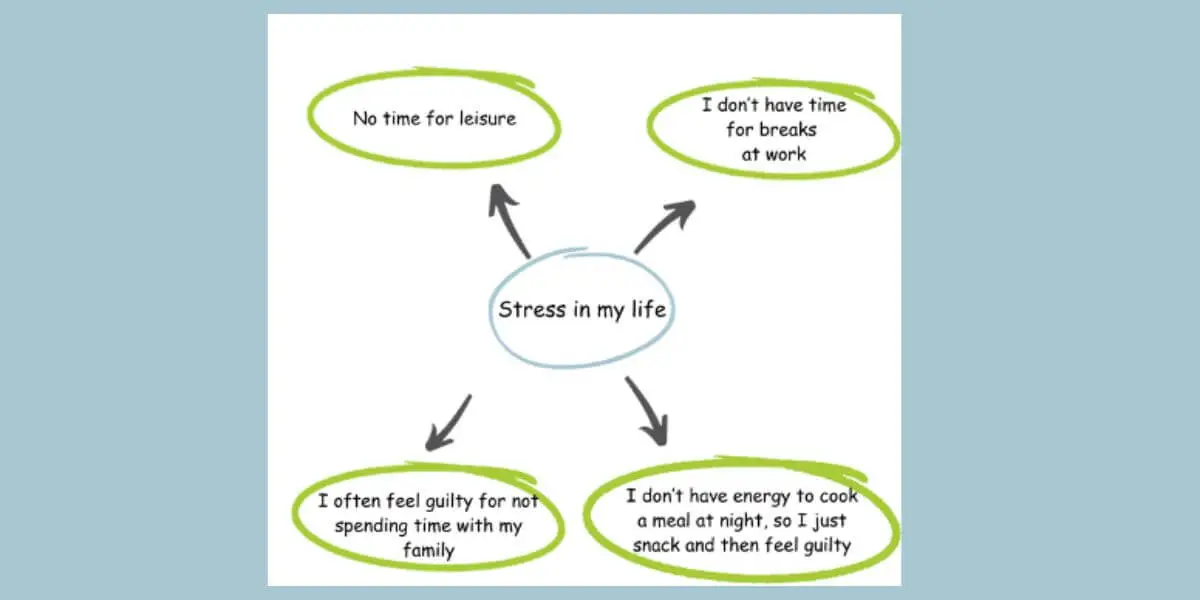
2. See which ones stand out for you or which might have a similar root.
Your mind map may show you that you are too busy. To help with this, maybe you assess your day for clarity to see what needs changing. You may work through the following steps: –
– You write out what you do through each hour of the day.
– Next, you itemise each thing. You put a P next to things that bring you pleasure, T next to the things that are tasks and L next to things that are learning/mastery/interest to you.
Are there things in there that you are doing, but don’t have to? How much time is spent mindlessly doing things that don’t fulfil you? Maybe you are scrolling through Facebook, or reading too many news sites.
– What can you actively change that will free up some time? It could be allocating ten minutes at a set time to check your Facebook posts, or only reading one news site, or choosing to watch the news with your spouse. Maybe there is a task you are doing that isn’t essential. Can this be done by someone else or not at all?
– Next, do something with that time you have freed, that mentally or physically fulfils you. This may be playing with your kids or reading for half an hour. You might choose to expand on the mind map above and add in things that you can actively do.
It may be helpful to start off by only choosing one thing, so you don’t feel overwhelmed.
Remember, it is okay if this is something that you do in bite-sized steps. It does not need to all be accomplished at once, as that is not realistic. The more overwhelmed and stressed you are, the smaller you want the steps to be.
3. Talk to someone.
This may be a professional coach or councillor or maybe it is sharing with a family member or friend. Of course, I’d love this to be me, as often it needs to be individualised to address it from many perspectives and this is an area I love working on with clients, because it impacts so many parts of their lives.
Sharing with others can help you see solutions you hadn’t considered, helps you feel you’re not alone, may give you insights and perspectives you hadn’t thought of before and can give you someone to journey with through this transition.
Stress is complex and it can impact how you eat, what your body does with that food, your digestion, your weight, women’s health and your overall health.
However, stress does not have to rule your life. You can make the first step towards changing that. If you would like to work with me on this, contact me here.
